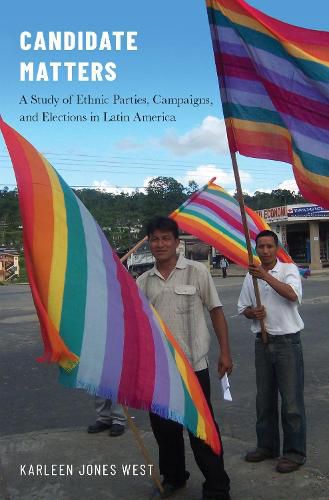Readings Newsletter
Become a Readings Member to make your shopping experience even easier.
Sign in or sign up for free!
You’re not far away from qualifying for FREE standard shipping within Australia
You’ve qualified for FREE standard shipping within Australia
The cart is loading…






In developing democracies, political parties built around charismatic personalities, coupled with populist campaigns, often ascend to power. This tactic has long been effective in Latin America, and has resulted in parties that rely heavily on personalistic appeals and vote-buying. The predominant view is that ethnic parties are an exception to this rule; they behave differently from traditional populist parties by attracting voters based on the expectation that they will create policies to provide for the groups that they represent. In Candidate Matters: A Study of Ethnic Parties, Campaigns, and Elections in Latin America, Karleen Jones West shows that under certain conditions, niche parties–such as ethnic parties–are not that different from their mainstream counterparts. Through a detailed examination of the Pachakutik party in Ecuador, she shows that the characteristics of individual candidates campaigning in their districts shapes party behavior. Ethnic parties that are initially programmatic can become personalistic and clientelistic because vote-buying is an effective strategy in rural indigenous areas, and because candidates with strong reputations and access to resources can create winning campaigns that buy votes and capitalize on candidates’ personal appeal. Why do niche parties in developing democracies struggle to maintain programmatic and meaningful platforms? West argues that when candidates’ legislative campaigns are personalistic and clientelistic in their districts, niche parties are unable to maintain unified programmatic support. By combining in-depth fieldwork on legislative campaigns in Ecuador with the statistical analyses of electoral results and public opinion, she demonstrates the importance of candidates and their districts for how niche parties compete, win, and become influential in developing democracies.
$9.00 standard shipping within Australia
FREE standard shipping within Australia for orders over $100.00
Express & International shipping calculated at checkout
In developing democracies, political parties built around charismatic personalities, coupled with populist campaigns, often ascend to power. This tactic has long been effective in Latin America, and has resulted in parties that rely heavily on personalistic appeals and vote-buying. The predominant view is that ethnic parties are an exception to this rule; they behave differently from traditional populist parties by attracting voters based on the expectation that they will create policies to provide for the groups that they represent. In Candidate Matters: A Study of Ethnic Parties, Campaigns, and Elections in Latin America, Karleen Jones West shows that under certain conditions, niche parties–such as ethnic parties–are not that different from their mainstream counterparts. Through a detailed examination of the Pachakutik party in Ecuador, she shows that the characteristics of individual candidates campaigning in their districts shapes party behavior. Ethnic parties that are initially programmatic can become personalistic and clientelistic because vote-buying is an effective strategy in rural indigenous areas, and because candidates with strong reputations and access to resources can create winning campaigns that buy votes and capitalize on candidates’ personal appeal. Why do niche parties in developing democracies struggle to maintain programmatic and meaningful platforms? West argues that when candidates’ legislative campaigns are personalistic and clientelistic in their districts, niche parties are unable to maintain unified programmatic support. By combining in-depth fieldwork on legislative campaigns in Ecuador with the statistical analyses of electoral results and public opinion, she demonstrates the importance of candidates and their districts for how niche parties compete, win, and become influential in developing democracies.